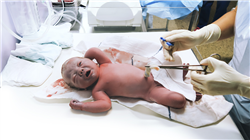University certificate
The world's largest faculty of medicine”
Introduction to the Program
Thanks to this 100% online Postgraduate certificate, you will obtain a solid theoretical and practical specialization in the management of premature newborns and those with neonatal pathologies”

Neonatal Intensive Care remains critical to ensure the survival and healthy development of preterm or impaired newborns. However, challenges persist, such as a shortage of skilled staff and the need for adequate resources to maintain quality of care.
For this reason, this Postgraduate certificate has been developed, which will offer solid specialization and will address fundamental and advanced aspects in neonatal care.
In this sense, physicians will analyze the essential techniques of neonatal monitoring, determining the most appropriate type of respiratory support in the neonatal stage, as well as the nutritional management of newborns with pathologies. This will provide a solid foundation for understanding and addressing the initial challenges in Neonatal Intensive Care.
Likewise, professionals will acquire expertise in the pathophysiology of conditions such as Hyaline Membrane Disease (HMD) and Persistent Pulmonary Hypertension (PPH), as well as skills in the diagnosis and treatment of Neonatal Sepsis. In addition, the syllabus will focus on the management of complex cases, such as Extreme Premature Neonates, Congenital Heart Disease and Neurological Disorders, providing graduates with the necessary tools to address these situations effectively and accurately.
In this situation, TECH has developed a complete online program, specially designed to fit the individual needs of the student body, eliminating the need to physically attend a location or comply with established schedules. Additionally, it is supported by the revolutionary Relearning methodology, which consists of the repetition of essential concepts to guarantee an optimal and organic understanding of the contents.
Bet on TECH! You will acquire advanced skills in the use of monitoring techniques, as well as in the management of complex clinical situations, such as Persistent Pulmonary Hypertension and Neonatal Sepsis"
This Postgraduate certificate in Neonatal Intensive Care contains the most complete and up-to-date scientific program on the market. The most important features include:
- The development of practical cases presented by experts in Neonatal Intensive Care
- The graphic, schematic and eminently practical contents with which it is conceived gather scientific and practical information on those disciplines that are indispensable for professional practice
- Practical exercises where the self-assessment process can be carried out to improve learning
- Its special emphasis on innovative methodologies
- Theoretical lessons, questions to the expert, debate forums on controversial topics, and individual reflection assignments
- Content that is accessible from any fixed or portable device with an Internet connection
You will analyze the various pathologies that can affect newborns, including Congenital Heart Disease and Neurological Disorders, through an extensive library of multimedia resources"
The program’s teaching staff includes professionals from the field who contribute their work experience to this educational program, as well as renowned specialists from leading societies and prestigious universities.
The multimedia content, developed with the latest educational technology, will provide the professional with situated and contextual learning, i.e., a simulated environment that will provide immersive education programmed to learn in real situations.
This program is designed around Problem-Based Learning, whereby the professional must try to solve the different professional practice situations that arise during the course. For this purpose, students will be assisted by an innovative interactive video system created by renowned and experienced experts.
You will address the determinant process of selecting between Non-Invasive and Invasive Respiratory Support, crucial to maintain respiratory stability in newborns. With all TECH's quality guarantees!"

You will delve into the pathophysiology of Hyaline Membrane Disease (HMD), preparing you in the specialized care of neonates affected by this condition. What are you waiting for to enroll?"
Why study at TECH?
TECH is the world’s largest online university. With an impressive catalog of more than 14,000 university programs available in 11 languages, it is positioned as a leader in employability, with a 99% job placement rate. In addition, it relies on an enormous faculty of more than 6,000 professors of the highest international renown.

Study at the world's largest online university and guarantee your professional success. The future starts at TECH”
The world’s best online university according to FORBES
The prestigious Forbes magazine, specialized in business and finance, has highlighted TECH as “the world's best online university” This is what they have recently stated in an article in their digital edition in which they echo the success story of this institution, “thanks to the academic offer it provides, the selection of its teaching staff, and an innovative learning method aimed at educating the professionals of the future”
A revolutionary study method, a cutting-edge faculty and a practical focus: the key to TECH's success.
The most complete study plans on the university scene
TECH offers the most complete study plans on the university scene, with syllabuses that cover fundamental concepts and, at the same time, the main scientific advances in their specific scientific areas. In addition, these programs are continuously being updated to guarantee students the academic vanguard and the most in-demand professional skills. In this way, the university's qualifications provide its graduates with a significant advantage to propel their careers to success.
TECH offers the most comprehensive and intensive study plans on the current university scene.
A world-class teaching staff
TECH's teaching staff is made up of more than 6,000 professors with the highest international recognition. Professors, researchers and top executives of multinational companies, including Isaiah Covington, performance coach of the Boston Celtics; Magda Romanska, principal investigator at Harvard MetaLAB; Ignacio Wistumba, chairman of the department of translational molecular pathology at MD Anderson Cancer Center; and D.W. Pine, creative director of TIME magazine, among others.
Internationally renowned experts, specialized in different branches of Health, Technology, Communication and Business, form part of the TECH faculty.
A unique learning method
TECH is the first university to use Relearning in all its programs. It is the best online learning methodology, accredited with international teaching quality certifications, provided by prestigious educational agencies. In addition, this disruptive educational model is complemented with the “Case Method”, thereby setting up a unique online teaching strategy. Innovative teaching resources are also implemented, including detailed videos, infographics and interactive summaries.
TECH combines Relearning and the Case Method in all its university programs to guarantee excellent theoretical and practical learning, studying whenever and wherever you want.
The world's largest online university
TECH is the world’s largest online university. We are the largest educational institution, with the best and widest online educational catalog, one hundred percent online and covering the vast majority of areas of knowledge. We offer a large selection of our own degrees and accredited online undergraduate and postgraduate degrees. In total, more than 14,000 university degrees, in eleven different languages, make us the largest educational largest in the world.
TECH has the world's most extensive catalog of academic and official programs, available in more than 11 languages.
Google Premier Partner
The American technology giant has awarded TECH the Google Google Premier Partner badge. This award, which is only available to 3% of the world's companies, highlights the efficient, flexible and tailored experience that this university provides to students. The recognition as a Google Premier Partner not only accredits the maximum rigor, performance and investment in TECH's digital infrastructures, but also places this university as one of the world's leading technology companies.
Google has positioned TECH in the top 3% of the world's most important technology companies by awarding it its Google Premier Partner badge.
The official online university of the NBA
TECH is the official online university of the NBA. Thanks to our agreement with the biggest league in basketball, we offer our students exclusive university programs, as well as a wide variety of educational resources focused on the business of the league and other areas of the sports industry. Each program is made up of a uniquely designed syllabus and features exceptional guest hosts: professionals with a distinguished sports background who will offer their expertise on the most relevant topics.
TECH has been selected by the NBA, the world's top basketball league, as its official online university.
The top-rated university by its students
Students have positioned TECH as the world's top-rated university on the main review websites, with a highest rating of 4.9 out of 5, obtained from more than 1,000 reviews. These results consolidate TECH as the benchmark university institution at an international level, reflecting the excellence and positive impact of its educational model.” reflecting the excellence and positive impact of its educational model.”
TECH is the world’s top-rated university by its students.
Leaders in employability
TECH has managed to become the leading university in employability. 99% of its students obtain jobs in the academic field they have studied, within one year of completing any of the university's programs. A similar number achieve immediate career enhancement. All this thanks to a study methodology that bases its effectiveness on the acquisition of practical skills, which are absolutely necessary for professional development.
99% of TECH graduates find a job within a year of completing their studies.
Postgraduate Certificate in Neonatal Intensive Care
The Postgraduate Certificate in Neonatal Intensive Care created by TECH Global University is a specialized training designed for health professionals who wish to acquire advanced knowledge and practical skills in the care of critically ill newborns. This program, delivered 100% online, provides a solid theoretical foundation and practical experiences that are fundamental to providing high quality care in neonatal intensive care units (NICUs). The program covers a wide variety of topics crucial to the care of critically ill newborns. From managing extremely small preemies to caring for infants with complex medical conditions, you will learn how to identify, assess and treat the most common and urgent neonatal emergencies. Initial stabilization, continuous monitoring, ventilatory support and specialized nutrition, among other critical issues, are covered. One of the key advantages of this course is its practical, case-based approach. Through simulations and case studies, you will acquire practical skills in critical decision making and effective management of complex situations in the NICU. This enables you to develop essential competencies to deliver patient-centered care and improve clinical outcomes for newborns.
Specialize in neonatal intensive care.
The online modality of the course offers flexibility and convenience, allowing you to access the content from anywhere and at any time that fits your schedule. Through an advanced educational platform, you will benefit from interactive resources that enrich your learning and encourage peer-to-peer collaboration. The course is led by a team of neonatal intensive care experts who provide personalized guidance and support throughout the program. Their clinical experience and expertise ensure high quality training relevant to the demands of today's critical neonatal care. Enrolling in this University Course represents a valuable investment in working in the neonatal area. This advanced training provides the tools necessary to deliver high quality care and improve health outcomes for the most vulnerable newborns, thereby helping to save lives and promote neonatal wellness.







